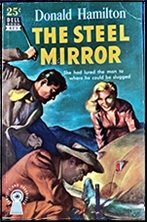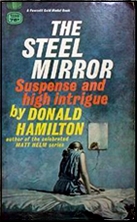Thu 21 Apr 2022
Reviewed by Tony Baer: DONALD HAMILTON – The Steel Mirror.
Posted by Steve under Reviews[5] Comments
DONALD HAMILTON – The Steel Mirror. Rinehart & Co., hardcover, 1948. Dell #473, paperback, mapback edition, 1950; cover by Robert Stanley. Gold Medal, d1617, paperback. Film: United Artists, 1957, as Five Steps to Danger.

So, I know I’m supposed to read Donald Hamilton. And I know this isn’t the one you’re supposed to start with. But it’s one I happen to have in paperback. And we’re on vacation on the beach in North Carolina this week. And reading vintage Gold Medal’s on the beach, sitting on a lawn chair, with an ice cold can of beer, while one’s children run around building sand castles, jumping waves, flying kites and collecting shells, is one of the most truly wonderful experiences in the world.
And I’ve been meaning to read the guy. So, why not?
This man Hamilton can really write. And grab you. He’s really good.
Problem is, I’m not sure if in the end he has anything to say. Which is to say that, to me, it feels like the plot is just scaffolding to hold terrific prose.
In terms of plot, the book is pretty heavy on the postwar paranoia Russian spy angle. And that’s not really my bag. Though current events may bring this sub genre back into style.
John Emmett has a month off between jobs. He had a job in DC, but it was a temp job filling in for a returning soldier. He got a new job in Bakersfield and bought a cheap junker to take a slow meander cross country to his new gig.
Unfortunately it breaks down in Iowa. And the cost to fix it outstrips the value of the car. So he’s resigned to taking the train when an overheated pretty lady in an overheated car stops into the garage. When he finds out she’s heading west one of them picks up the other, it’s not clear which, and they head off in her convertible.

Turns out she’s recently come out of the loony bin, having PTSD from being held in a Nazi concentration camp as part of the French resistance. She has amnesia about whether or not she ratted out her resistance comrades, leading to their demise.
She finds out that a former co-prisoner is now a professor in Denver — so she’s headed there to try to fill in the blanks in her memory.
Unfortunately, Russian spies don’t seem to want her to meet the professor. And will do anything in their power to stop her from reaching her destination.
The story is pretty enthralling until you finish it. You turn the pages as quickly as you can. And then, by the end, you wonder why you wasted your time.
I mean it was fun and everything, I guess. But looking back it kinda reminded me of the ending of Neil Simon’s Murder by Death in which the murderer confesses at the end and then takes off mask after mask after mask, where by the end every single character has plausibly confessed.
It’s not quite as ridiculous as that. But the depth of supposed Russian double agent state infiltration runs so deep it makes McCarthyism seem understated.
Anywho, like I was saying, this Hamilton guy can really write. And one thing I really came to appreciate from the guy is how he makes setting descriptions a part of the story itself. He doesn’t use metaphor to show what a great poet he is. He uses it to advance the tension and move the story. Which is something too few writers do. Nothing makes me shut a book quicker than a cliched, unnecessary metaphor.
Let me illustrate just how good Hamilton is at this:
First take the title itself:

Protagonist confusion:
The girl escapes capture, the protagonist wonders where she’s gone:
Marching at gunpoint:
Racing thru the mountains, tailed by villains:
As the protagonist figures out a major clue in the mystery:
The relationship between boy and girl starts to unravel:
“He looked past her at the moon setting toward the distant low black rim of the mountains to the west…. The buttes looked cold and bleak and hostile in the shimmering semidarkness. He had the sudden thought that probably things would have looked pretty much the same had they been on the moon watching the earth set. Then he recalled that the same side of the moon always faced the earth, so that, from the moon, the earth should never set.â€
April 22nd, 2022 at 12:21 am
A more enthusiastic take on it here: https://mysteryfile.com/blog/?p=63121
April 22nd, 2022 at 9:05 am
The general consensus is that if all you know of Donald Hamilton are his Matt Helm books, you’re missing a lot of good reading, especially his early books, such as this one.
April 22nd, 2022 at 9:37 am
I have seen Five Steps to Danger, a modest production with Sterling Hayden and Ruth Roman making acceptable leads, but it is a long way from Donald Hamilton’s work, which is not intended to be a complement to the filmmakers.
April 22nd, 2022 at 9:41 am
Very perceptive, Tony!
MIRROR was filmed in 1956, directed by Henry S Kesler, with Sterling Hayden, Ruth Roman, and Werner Klemperer. Not a bad film, but not terribly memorable either.
April 22nd, 2022 at 9:18 pm
“Problem is, I’m not sure if in the end he has anything to say.”
For me that pretty much nails Hamilton across the board. Things start well, the writing is good, and then it sort of fizzles, nothing much has happened, it’s all build-up, and it’s over.
I’ve always felt left down when I finish a Hamilton novel as if everything happened just to get to the same place we started.
I’m not suggesting all Hamilton books are that way, some of the Westerns are fine and I enjoy some of the early Helms and stand-alone suspense novels, and he is never less than a bright writer of outstanding prose, but over-all I come away wondering if I missed something everyone else is seeing.
I say this pointing out this is one of my favorite Hamilton novels, but that line so nails my general experience with Hamilton I have to validate the point.